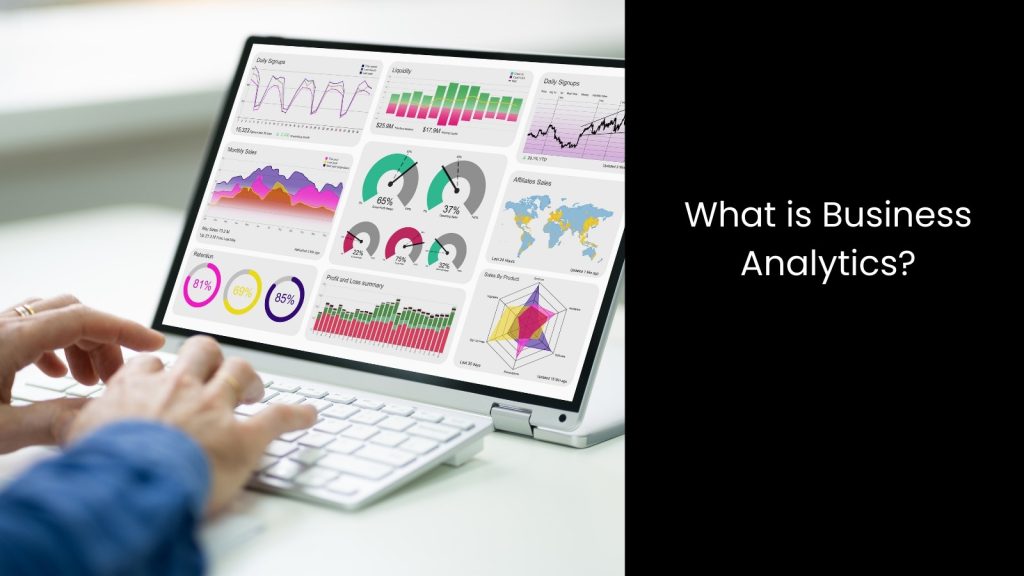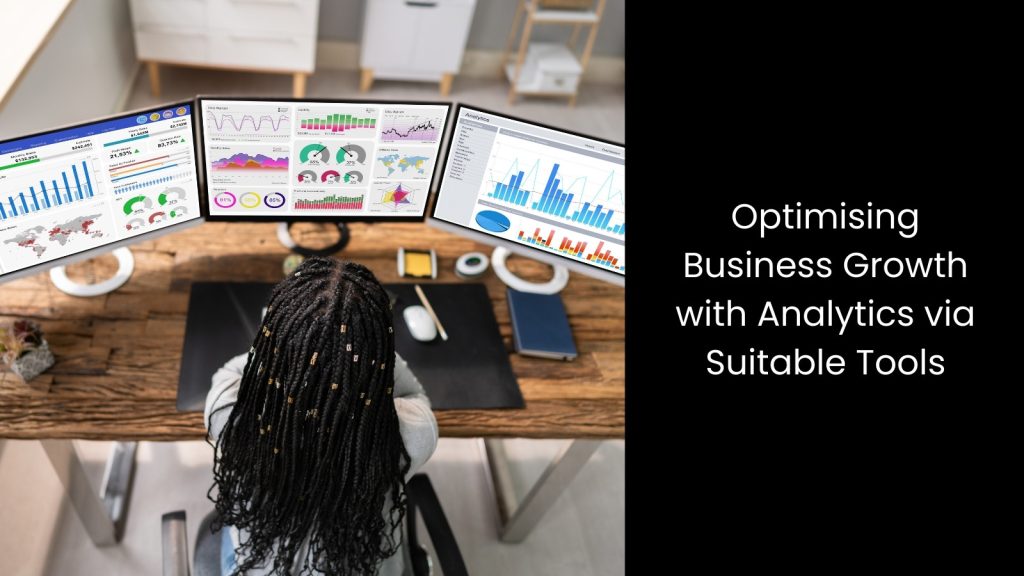Is your business in Singapore suffering from higher operational costs, decreased productivity, and lower overall profitability? Most likely, this is due to a lack of analytical power within your operational background. It is quite obvious that, without analytics, companies in today’s world face challenges in identifying inefficiencies within their operations. They also struggle to pinpoint areas where costs can be reduced, or processes can be improved. Understanding these concerns, Singapore’s businesses are witnessing a surge in demand for business analytics.
This article will explain why Singapore needs business analytics to stay competitive in this dynamic landscape.
We will look into
What is Business Analytics?

- This is not a new concept at all. If you look back to history, you will see that this concept has been in the picture since the 19th century.
- Business analytics involves using data to make smart decisions and improve how a company operates. It combines several methods and tools to collect, process, and analyse information from various sources. Businesses usually use these methods to understand patterns and trends, which helps them make better choices. For example, companies collect data on customer behaviour, sales figures, and market trends. They then use this information to find out what works well and what needs improvement.
- In the sense of business analytics, we can divide this into various parts. The list goes like this: Descriptive analytics looks at past data to describe what happened. Then comes the diagnostic analytics, which tries to understand why something happened. It also includes predictive analytics, which uses historical data to forecast future events, and prescriptive analytics, which suggests actions to take based on the predictions.
- In practice, business analytics helps companies improve their strategies by giving them insights into how to increase profits, reduce costs, and enhance customer satisfaction. For instance, a retail store will be able to analyse sales data to determine which products are most popular and adjust its inventory accordingly. Similarly, a company might use analytics to track employee performance and identify areas where training could boost productivity.
- As you can see, business analytics has not become a mere tool for businesses; it has become a part of ‘business success’ nowadays.
The Top 8 Reasons Why Business Analytics is in Demand in Singapore

Innovation and R&D Initiatives
This helps companies in Singapore with innovation and research and development (R&D) by providing valuable insights and guiding their efforts. Companies can use analytics to drive innovation as they analyse market trends, customer preferences, and competitive activities. This helps businesses identify new opportunities and understand what consumers want.
For instance, by studying customer feedback and usage patterns, companies can spot gaps in the market and create products that meet these needs. Analytics also optimises R&D processes by offering detailed data on what works and what does not during product development. This way, it helps businesses streamline their R&D efforts, reduce costs, and shorten development cycles.
If they keep using business analytics, companies in Singapore can innovate more effectively. They can also ensure that their new products and services are well-designed and meet market demands, ultimately giving them a competitive edge in the industry.
Customer Experience Optimisation
It is not a lie to say that this can offer deep insights into customer behaviour, preferences, and needs. Analytics helps businesses understand how customers interact with their products and services, revealing patterns and trends in their choices.
If put in simple words, businesses can analyse data from customer feedback, purchase history, and online interactions to see what products or services are most popular and where improvements are needed. This understanding allows companies to tailor their offerings to better meet customer demands.
In Singapore, where customers have high expectations for service quality, businesses use these insights to enhance their customer experiences. They can easily personalise marketing campaigns based on customer preferences, adjust product features to align with local tastes, or improve customer service by addressing common issues identified through data analysis.
Ongoing Digital Transformation
With the rise of digitalisation, businesses now gather huge volumes of data from various sources like social media, customer transactions, and online interactions. This is where advanced analytics tools help companies make sense of this data, turning it into useful insights.
If you have integrated business analytics, you can certainly use it to track and improve your digital marketing efforts, identify trends in customer behaviour, and streamline operations. Singapore is a prime market where companies need to adapt quickly to stay competitive.
As companies use business analytics, companies in Singapore can navigate the complexities of digital transformation smoothly.
Gaining Competitive Advantage
Another benefit is that the latter helps companies in Singapore gain a competitive advantage as it provides valuable insights that enable them to identify trends, optimise operations, and stay ahead in a fast-paced market. Let us explain how this occurs.
Businesses use analytics to analyse data from various sources, such as customer interactions, market research, and sales performance. If they can identify trends and patterns, companies can anticipate market changes and adjust their strategies accordingly.
For example, analytics can reveal shifts in customer preferences, allowing businesses to modify their products or services to better meet these demands. Additionally, analytics help optimise operations by highlighting inefficiencies and suggesting improvements. This is how Singapore easily seizes emerging opportunities and maintains a leading position in its industry.
Encouraging Data-Driven Decision Making
It is a certain fact that business analytics transforms data into actionable insights.
You know that companies in Singapore increasingly rely on data to make informed decisions. This makes business analytics essential for understanding and interpreting this information. It actually occurs this way: Analytics tools help businesses gather data from various sources, such as customer interactions, sales figures, and market trends, and then analyse it to reveal patterns and trends, as we mentioned before.
This analysis provides a clear picture of what is happening within the company and the market. This information helps businesses make better decisions about inventory, marketing strategies, and product development. This approach reduces the risk of costly mistakes and ensures that decisions align with actual market conditions and customer needs.
Economic Growth
As Singapore grows economically, businesses need analytics to support their growth strategies, market expansion, and economic resilience. How is this possible? Let us reveal this in the section below.
As we stated before, analytics helps companies understand market trends, customer needs, and competitive landscapes, which is essential for making informed decisions and planning for the future. This helps them expand into new areas with a higher chance of success. Not to mention that analytics supports strategic planning by providing insights into how well a company’s current strategies are performing and suggesting improvements.
In a rapidly evolving market like Singapore’s, where businesses face constant changes and challenges, analytics provides the tools to adapt and remain competitive. It indeed helps companies forecast economic trends, manage risks, and make data-driven decisions that drive growth without challenges.
Regulatory Compliance
You may have understood that you cannot play with Singapore’s laws. Especially those related to financial reporting and data protection, as they demand high levels of accuracy and transparency.
This is where analytics helps businesses meet these requirements smoothly. The question is how. This means that the latter provides tools to track, manage, and report data effectively. For example, companies use analytics to ensure they follow regulations by monitoring financial transactions, auditing records, and maintaining data privacy.
Not what they have to do is analyse data. This way, businesses can identify potential compliance issues before they become problems, reducing the risk of legal penalties and fines. Analytics also helps companies generate accurate reports required by regulatory bodies, ensuring that their financial statements and other documents meet legal standards.
Therefore, it is obvious that businesses benefit from using analytics to stay compliant, even in a strict landscape like Singapore. It simplifies the process of gathering and verifying information, improves the accuracy of compliance reporting, and helps companies respond quickly to changes in regulations. With business analytics in hand, businesses can walk away from penalties safely.
Risk Management
It is mandatory for a business to take risk management precautions.
When you are equipped with business analytics, it helps companies identify potential risks and develop strategies to handle them. This ensures business continuity and stability beyond doubt.
It is visible in today’s world that businesses in Singapore face various risks, such as financial uncertainties, market fluctuations, and operational challenges. Business analytics provides valuable insights by analysing data related to these risks.
For example, companies use analytics to track financial performance and market trends, helping them anticipate potential issues like economic downturns or shifts in customer preferences. Analytics also helps businesses evaluate their internal processes to spot weaknesses that could lead to operational disruptions.
Likewise, using advanced analytics tools, companies can develop effective risk mitigation strategies, such as adjusting their financial plans or improving their supply chain management. This wise approach helps them respond quickly to challenges while minimising their impact and maintaining stability.
Optimising Business Growth with Analytics via Suitable Tools

You may understand the importance of integrating business analytics into your business now. However, it is rather important to purchase the right analytics tools if you want optimal business growth. There is no need to exclaim how the right solution from a reputed provider can enable businesses to convert data into actionable insights, streamline processes, and identify strategic opportunities all under one dashboard in front of their eyes.

